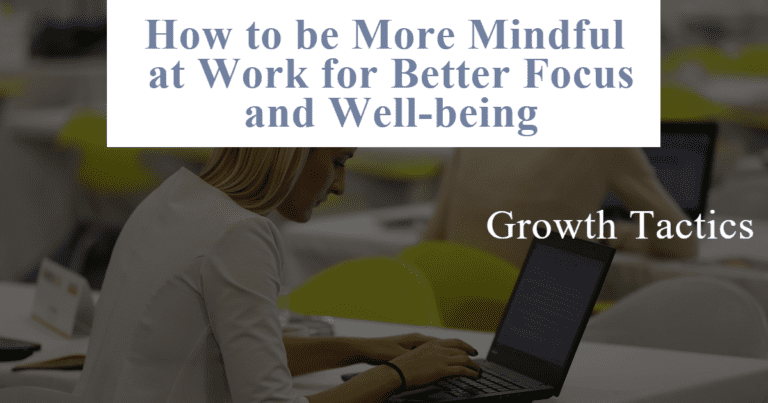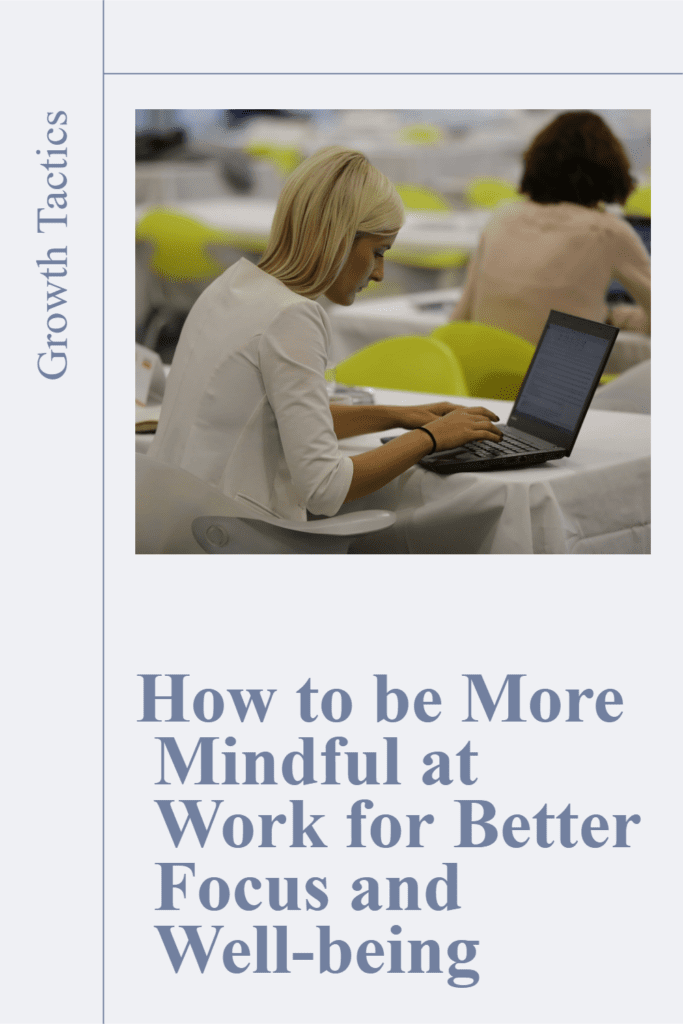In today’s fast-paced world, it’s easy to get caught up in a never-ending cycle of stress and distraction. But what if I told you that there’s a simple practice that can help you find balance, increase productivity, and improve your overall well-being? That’s right, we’re talking about being mindful at work.
Jump To Section
How Being Mindful Can Transform Your Workday
Before we dive into the specifics of mindfulness at work, let’s take a moment to understand what it means to be mindful. Mindfulness is the practice of being fully present and engaged in the current moment, without judgment. It’s about paying attention to your thoughts, emotions, and physical sensations, as well as the environment around you.
So, why should you care about being mindful at work? Well, the benefits are truly remarkable. By incorporating mindfulness into your daily routine, you can:
The Many Benefits of Mindfulness in the Workplace
In our previous discussions, we’ve already touched upon some key benefits of mindfulness at work. But let’s dive a little deeper and explore even more reasons why incorporating mindfulness into your workday can have a profound positive impact.
Improved Decision-Making Abilities
When you practice mindfulness, you develop a heightened sense of self-awareness. This self-awareness extends to your thoughts, emotions, and the impact they have on your decision-making process. By being mindful, you can step back, observe your thoughts objectively, and make more considered and rational decisions. This can lead to better outcomes, increased confidence, and more effective problem-solving.
Enhanced Emotional Intelligence
Mindfulness fosters the development of emotional intelligence, which is the ability to understand and manage your emotions, as well as empathize with others. When you’re mindful, you become more attuned to your emotions and can respond to them in a compassionate and constructive way. This not only improves your own emotional well-being but also enhances your interpersonal relationships and promotes a more harmonious work environment.
Increased Resilience
Work can be full of challenges and setbacks, but mindfulness can help you navigate these difficulties with greater resilience. By practicing mindfulness, you cultivate the ability to stay present, focus on solutions, and adapt to changing circumstances. This resilience allows you to bounce back from setbacks more quickly and maintain a positive mindset, even in the face of adversity.
Strengthened Relationships and Communication
Mindfulness encourages active listening, empathy, and non-judgmental understanding, all of which are crucial for effective communication and relationship-building in the workplace. When you’re fully present and attentive in conversations and meetings, you can truly understand the perspectives of others and respond in a thoughtful and meaningful way. This leads to stronger connections, improved collaboration, and better teamwork.
Heightened Creativity and Innovation
In the zone of mindfulness, you can tap into your creative potential and unlock innovative ideas. By quieting the noise in your mind and being fully present, you create space for new thoughts, perspectives, and insights to arise. This heightened creativity can inspire fresh approaches to problem-solving, encourage out-of-the-box thinking, and lead to more innovative solutions in the workplace.
Improved Work-life Balance
Mindfulness can help you find a better balance between work and personal life. By being fully present and engaged in the moment, you can focus on work during work hours and truly relax and rejuvenate during your personal time. Mindfulness can also create a sense of detachment from work-related stress and worries when you’re off the clock, allowing you to fully immerse yourself in enjoying your personal life.
Enhanced Overall Well-being
Last but certainly not least, mindfulness contributes to your overall well-being. By reducing stress levels, promoting relaxation, and improving mental clarity, mindfulness at work can increase your overall happiness and satisfaction. When you approach your work with a calm and focused mindset, you’re more likely to feel fulfilled and content in both your professional and personal life.
So, as you can see, the benefits of mindfulness in the workplace are plentiful. From improved decision-making and emotional intelligence to increased resilience and creativity, practicing mindfulness can transform your work experience into one that is more fulfilling, balanced, and enjoyable.
How to Practice Mindfulness at Work?
Now that we understand the benefits of mindfulness at work, let’s explore some practical ways to incorporate this practice into our daily routines. Here are some key strategies and exercises to help you become more mindful in the workplace:
1. Set Intentional Moments of Mindfulness
Take a few moments at the start of your day to set an intention to be mindful throughout. You can do this by taking a few deep breaths and bringing your awareness to the present moment. By consciously choosing to be mindful, you’ll be more likely to stay present and focused as you navigate your workday.
2. Practice Mindful Breathing
One of the simplest and most powerful mindfulness exercises is mindful breathing. Take a few moments throughout the day to close your eyes, take a deep breath in, and consciously exhale. Focus your attention on the sensation of your breath entering and leaving your body. This can help you anchor yourself in the present moment and bring a sense of calm and clarity.
3. Create Mindful Transitions
Rather than rushing from one task to another, create mindful transitions between activities. Take a few moments to pause, reflect, and reset your mindset before moving on to the next task. This can help you maintain your focus and prevent mental fatigue.
4. Engage in Mindful Listening
In meetings and conversations, practice mindful listening. Instead of planning your response or getting lost in your own thoughts, truly listen to what the other person is saying. Pay attention to their words, tone, and body language. By being fully present in your interactions, you can cultivate stronger relationships and improve communication.
5. Take Mindful Breaks
Schedule regular breaks throughout the day to recharge and reset your mind. Use these breaks as an opportunity to engage in mindfulness exercises such as stretching, walking, or simply observing your surroundings. By taking intentional breaks, you can prevent burnout and maintain a healthy work-life balance.
More Mindful Exercises to Enhance Your Workday
In addition to the mindfulness strategies we’ve already discussed, there are many more exercises you can try to bring a greater sense of mindfulness to your workday. These exercises can help you stay present, reduce stress, and improve your overall well-being. Let’s explore a few of them:
1. Mindful Walking
Take a break from your desk and go for a mindful walk. As you walk, bring your attention to the sensation of your feet hitting the ground, the feel of the air against your skin, and the sights and sounds around you. Engage all your senses and immerse yourself in the present moment. This can be a refreshing way to clear your mind and find renewed focus.
2. Gratitude Practice
At regular intervals throughout the day, take a moment to reflect on what you’re grateful for in your work environment. It could be the support of your colleagues, the opportunity to learn and grow, or even something as simple as a comfortable chair or a good cup of coffee. Focusing on gratitude can shift your mindset to a more positive and appreciative state, reducing stress and increasing overall satisfaction.
3. Mindful Eating
Instead of rushing through your lunch break, take the time to practice mindful eating. Pay attention to the texture, flavor, and aroma of your food. Slow down and savor each bite. Notice the sensations in your body as you eat. By fully engaging in the act of eating, you can enhance your enjoyment and bring a sense of mindfulness to this everyday activity.
4. Body Scan
Take a few minutes to do a quick body scan exercise at your desk. Close your eyes and bring your attention to each part of your body, starting from your toes and moving all the way up to the top of your head. Notice any areas of tension or discomfort, and consciously release any tension you may be holding. This can help you relax and bring a greater sense of physical well-being to your workday.
5. Gratitude Journaling
Set aside a dedicated journal where you can write down three things you’re grateful for at the end of each workday. It could be an accomplishment you’re proud of, a positive interaction with a co-worker, or simply the opportunity to do meaningful work. Writing down your gratitude can help you cultivate a positive mindset and bring more joy and fulfillment into your work life.
6. Mindful Breathing Breaks
In addition to incorporating mindful breathing into your daily routine, you can also take short mindful breathing breaks throughout the day. Set a timer for a couple of minutes, find a quiet space, and focus on your breath. Allow yourself to fully inhale and exhale, paying attention to the sensation of your breath filling your lungs and leaving your body. This mini-meditation can help you reset and find calm amidst a busy workday.
Remember, each of these exercises is an opportunity to bring a greater sense of mindfulness to your workday. Experiment with different techniques and find what resonates with you the most. By practicing mindfulness, you can create a more balanced, productive, and fulfilling work environment for yourself and those around you.
So, take a moment to try out these exercises and see how they can enhance your workday. Embrace the power of mindfulness and pave the way to a more centered and rewarding professional life.
The Path to a More Mindful Workplace
Now that you have a deeper understanding of mindfulness and some practical strategies to implement, it’s time to take action. Consider sharing these ideas with your colleagues or even starting a workplace mindfulness program. By encouraging a culture of mindfulness, you can create a more positive and productive work environment for everyone.
In summary, being mindful at work is not just a buzzword; it’s a powerful tool for personal growth and professional success. By incorporating mindfulness into your daily routine, you can enhance your focus, reduce stress, and boost your overall well-being. So, take a moment to pause, breathe, and embrace the power of mindfulness in the workplace.
Remember:
-
Set intentional moments of mindfulness throughout your day.
-
Practice mindful breathing to anchor yourself in the present moment.
-
Create mindful transitions between tasks to maintain focus.
-
Engage in mindful listening for better communication.
-
Take mindful breaks to prevent burnout and maintain balance.
Embrace the power of mindfulness, and watch as your workday transforms into a more fulfilling and productive experience.


